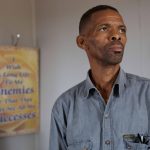Workers take Oak Valley to court over ‘inhumane’ housing
Farm workers in the Western Cape winelands are still living in single-sex hostels at Oak Valley, as they were during apartheid. Now they are taking legal action.
Author:
25 July 2019

In the pristine lands of one of the Western Cape’s best known farms, workers are restless. After months of negotiations and protest action, they have filed a court application for a declaration that Oak Valley, a farm nestled in the Grabouw winelands, has behaved unlawfully because of its failure to provide humane living conditions for black African workers and their families.
Some of the labourers have spent more than 20 years working on the farm and living in the single-sex male hostels that the farm has provided as housing. There are 42 workers who have applied to the equality court for an inquiry to be held into the accommodation provided by Oak Valley.
These men are all migrant labourers from the Eastern Cape village of Qumbu, and because of the farm’s single-sex hostel policy, they are unable to live on the farm with their families. They grow flowers and fruit and they also harvest the produce that their successful employers sell to some of the biggest retailers in South Africa.
Related article:
In court papers filed in the first week of July, the workers sought an order from the court that Oak Valley and its labour broker, Boland Labour Law Consultants, must provide “adequate, humane and decent living conditions” for all employees and their families living on the farm. The workers are all members of the Commercial, Stevedoring, Agricultural and Allied Workers Union (CSAAWU), which has led them in a three-month-long strike, but with no assurance that the single-sex hostels will be converted into family housing, they are desperate to force the farm to allow them to live with their families.
Inhumane housing
Sibongile Rarayi has worked at Oak Valley for 22 years. The 47-year-old has lived in the single-sex hostels for all that time, while his wife and four children – aged between 10 and 22 – live in Qumbu.
Rarayi has no place on the farm where his wife and children can stay when they visit. The families are barred from sleeping in the same quarters on the farm, and workers often have to rent rooms or houses in townships to accommodate their families.
Dissatisfied with the way he and his coworkers have been treated by the farm, Rarayi is now the first applicant in the case at the equality court to force the farm to deliver family housing. Rarayi knows that the Rawbone-Viljoen family, the founders of the Oak Valley estate, have been successful in their farming and business endeavours, yet he believes that the workers who have contributed to that success have been dealt a bitter blow.
Related article:
The workers live in small bedrooms with one window and two bunk beds, about a metre apart. Four workers occupy most rooms. They share communal bathrooms where until a month ago, no partition had existed between the showers to protect the privacy of each worker. The farm started to address the bathroom conditions in the hostel after an intervention by the South African Human Rights Commission in June.
“I submit that our landlord is in a privileged position and the corporate entities under his control are not sharing their wealth with us, their lifelong workers, and more particularly not allowing us to experience family life for our working lives, in the manner that it [was] afforded to the Viljoen and Rawbone-Viljoen family over more than a century,” Rarayi said in his court papers.
The equality court hears cases involving unfair discrimination, hate speech and harassment. Judge John Hlophe, the presiding officer at the court, will now have to decide where the workers’ case should be heard. If he decides that it will be heard in the equality court, the court will begin an inquiry to determine whether Oak Valley is guilty of the allegations of discrimination made by its workers.
A farm built on the backs of its workers
Oak Valley has said 59 workers live in the hostels in 2019. The farm’s managing director Christopher Rawbone-Viljoen, who has five directorships in the farming industry, has confirmed that the farm will be opposing the application. The farm is currently locked in wage negotiations with CSAAWU and its members.
“The relief being sought by the applicants in the Equality Court application is for the company to build new houses for all workers on Oak Valley. We will be opposing the application. I can’t comment further as the matter is to be heard in court,” said Rawbone-Viljoen by email.
The estate was established in 1898 and spans 1 786 hectares. It was purchased in December 1898 by its founder Sir Antonie Viljoen, and has since grown into an internationally recognised enterprise. Viljoen has been described by the farm as a “pioneer” in farming apples and pears. Notable South African retailers, including Spar, Woolworths and Checkers, are buyers of Oak Valley estate produce and the business has diversified to include meat, wine and flowers alongside its fruit farming business.
Related article:
For Rarayi, being separated from his family has been devastating: his wife has become the sole carer at home for their children, and he has been unable to be present as a father in their household. He has accused the farm of treating workers who are not from the Eastern Cape better than how it has treated him and his colleagues in the hostels.
“I say that I have given the better part of my life to my employer and I have received very little in return. Compared to my employer and landlord, and for that matter, certain other employees and farm dwellers who are not from the Eastern Cape, my life is miserable and so are the lives of my co-applicants,” says Rarayi.
How the hostel system ruins families
In order to visit their husbands on the farm, women from Qumbu must take a 1 215km journey to meet with their husbands in nearby Grabouw.
“Generally, women are concerned about the prolonged absence from their husbands and the threat of infidelity and mistrust that brews. In addition the health risks related to infidelity, namely sexual transmitted diseases and infections (STDs and STls), were raised and the risk of bringing disease into the family is a serious concern for wives,” Mercia Andrews, the national director of non-profit organisation Trust for Community Outreach and Education (TCOE), wrote in her court papers.
Related article:
The TCOE has worked closely with CSAAWU and other farm workers across the Westen Cape in both activism and academic research work. The organisation interviewed the families of the 42 workers who applied to the equality court after hearing about the conditions in which they live. Andrews has supported the workers’ application to the equality court with an affidavit from the TCOE.
She argued that the conditions the farm has provided for its workers have a legacy in the migrant labour hostel system under apartheid, a system which, she said, is very much intact in parts of the Western Cape, where private farms still expect the state to provide proper basic services for their workers. Arguing against the sustainability of this approach, Andrews explained that the equality court needs to be persuaded that “the private sector shares responsibility to eradicate the vestiges of the apartheid African male migrant labour system on farms in the Western Cape and the Elgin Valley.”
Rawbone-Viljoen has said that only “seasonal” workers live in the “seasonal accommodation”, but many of the workers have said they have been working and living on the farm for years and have simply not been made permanent.
Rarayi says the farm’s success has largely been built on the backs of its workers. “We ask that the descendants of the pioneer settlers and entrepreneurs now dig deep into their consciences … and allow our wives and children to join us on the farms which we gave decades of our working lives,” he says.




